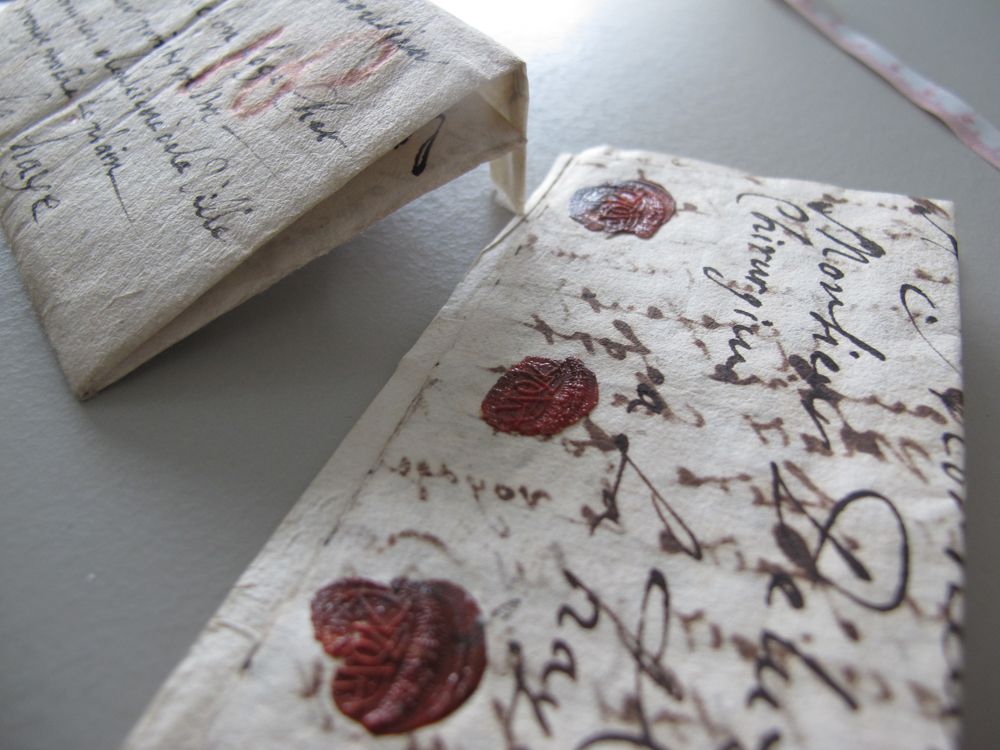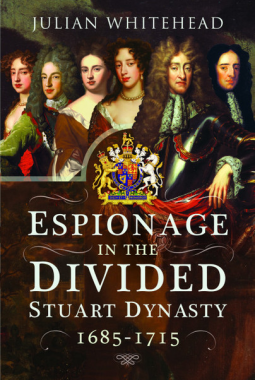Synopsis: King James II was the Catholic king of a Protestant nation, but he had inherited a secure crown and was able to put down the rebellion by his nephew the Duke of Monmouth. In just over three years James had been deserted by those he loved and trusted and had to flee to France in exile. His throne was seized by his son-in-law and daughter, and when they died, his younger daughter succeeded. For James it was a personal tragedy of King Lear proportions; for most of his subjects it was a ‘Glorious Revolution’ that saved his kingdoms from Popery.
Over the next hundred years James or his descendants would attempt to win back the crown with French support and conspiring with British Jacobites and Tories. In Espionage in the Divided Stuart Dynasty Julian Whitehead charts the inner workings of government intelligence during this unstable period, where it was by no means a forgone conclusion that James or his heirs would never regain the throne. It throws light on the murky world of spies and double agents at a time of intensive intrigue and betrayal, with many politicians and peers trying to keep a foot in both camps. It was especially important in such circumstances for a monarch to receive good intelligence about the many intrigues, but could those providing the intelligence be trusted?
This is another one of those books which has me conflicted. On the one hand, it is an engrossing tale of the reign of James II of England and the subsequent quest for the throne after he fled in the face of growing religious opposition and the invasion by invitation of William of Orange - "... the overriding issue that was to fracture both family and nation was religion ..". And for someone dipping their toes into this period, it is a highly useful and informative resource.
Over the next hundred years James or his descendants would attempt to win back the crown with French support and conspiring with British Jacobites and Tories. In Espionage in the Divided Stuart Dynasty Julian Whitehead charts the inner workings of government intelligence during this unstable period, where it was by no means a forgone conclusion that James or his heirs would never regain the throne. It throws light on the murky world of spies and double agents at a time of intensive intrigue and betrayal, with many politicians and peers trying to keep a foot in both camps. It was especially important in such circumstances for a monarch to receive good intelligence about the many intrigues, but could those providing the intelligence be trusted?
This is another one of those books which has me conflicted. On the one hand, it is an engrossing tale of the reign of James II of England and the subsequent quest for the throne after he fled in the face of growing religious opposition and the invasion by invitation of William of Orange - "... the overriding issue that was to fracture both family and nation was religion ..". And for someone dipping their toes into this period, it is a highly useful and informative resource.
On the other it purports to be a look at the role of espionage during this particular period in English history - which leads to more conflict as I find this component to be - at times - somewhat overshadowed by the first (ie: the history).
As my reading "career" has progressed, I have surpassed the general histories and am looking for more niche subjects. I guess what I was hoping for was more on the espionage side of things rather than a history of the Jacobites for I think to pick up this tome based on title alone one already assumes some understanding of events. I wanted to know more about the methods - the modus operandi, the people involved, the problems they faced - a bit more along the lines of Michael Smith's "Anatomy of a Spy" wherein each chapter highlights a particular theme with examples given to illustrate.
 |
| James II of England |
England in the 17th and 18th centuries faced a very fluid, very dangerous and incredibly complex situation of threats from France, Scotland, the Netherlands, the Papacy, and Spain. Here was a country that was outnumbered and surrounded by its much more powerful continental European rivals. Into this mix was added the overt religious and domestic political factions, and finally the Jacobites.
As Paul Fritz notes in The Anti-Jacobite Intelligence System of the English Ministers, 1715–1715 - "Their earlier experiences of attempted plots, near assassinations, foreign aid, open rebellion, and the inability to gauge the movement's strength, created in the ministers between 1715 and 1745 an almost pathological fear of a Stuart restoration - Jacobites must be hunted out, their secrets penetrated, their plans squashed. The best evidence of this pre-occupation of the government with fear of a Stuart restoration lies in an examination of its methods of securing intelligence through the post office, the employment of spies, and personal interviews [interrogations] with the Jacobites themselves."
So, to deal with this myriad of problems, England like its European counterparts, set up elaborate intelligence gathering systems. It relied heavily on intercepted mail and dispatches. A few agents in the postal system could intercept likely correspondence and have it deciphered, copied and forwarded to the intended receiver. And here a real gem of information stands out - Cromwell's "machines of intelligence". What were these machines that could "open, copy and seal letters" that were rebuilt by John Wildman when he was in charge of the Post Office but later destroyed when he was suspected of disloyalty. I wanted to know more but alack and alas nothing more was forthcoming. Moving on, once the information was in hand, analysts (set up in the cabinet noir or black chamber) tried to interpret diplomatic policies and intentions of states.
Information dispersal via propaganda and disinformation was another favoured tool - "... because just as governments developed their arcana imperii, or secrets of state, outside in the world a new landscape of media thronged with reams of printed newspapers, pamphlets and books, while in coffee houses political gossip and whispered knowledge flourished – of politicians, but also of the state’s secret affairs ...". In addition, the threat of Jacobitism triggered a new period of military map making with the state urgently requiring details on fortifications, landscapes, roads and rebels - a theme that was not touched upon.
 |
| Sealed Letters |
Active agents or spies were also used, especially to estimate military and naval strength and associated activities. These agents, spies and informers were recruited from all aspects of society - diplomats, military, religious, refugees, defectors, fellow exiles, prisoners and captives, local government officials, professional agents provocateur. What I personally gained from this was that espionage was personal - adherence was to religion, nation, monarch but aboveall, to self preservation. Informants transferred their allegiance to whomever paid the most - "... there was money to be had for information ..." - or could offer them the best deal, usually reward or preferment, life and liberty. Lack of opportunity or advancement led some informants to play both sides of the fence. Towards the end of the period under discussion, it is noted that intelligence was "... dominated by adventurers motivated by self-interest and money and thus untrustworthy and often double agents ...".
 |
| Jacobites |
The methods used by the Jacobites, French, Dutch and English were not dissimilar - some were more effective in the collection, collation and usage of intel gathered than others. For as Hugh Douglas, author of Jacobite Spy Wars: Moles, Rogues and Treachery, notes, "... the final betrayal of the Stuart cause had not come about through a mistress's pillow talk: they had finally been shafted by one of their own needy Highland chiefs.."
Further reading:
A history of espionage in early-modern Britain, 1598-1715 by Alan Marshall (publication pending)
The Secret Service under Charles II and James II by James Walker
The Stuart Court in Exile and the Jacobites edited by Eveline Cruickshanks and Edward Corp


No comments:
Post a Comment